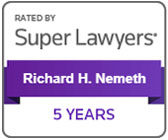Personal Bankruptcy

Chapter 7 is by far the most common form of bankruptcy. “Chapter 7” refers to the chapter of the United States Bankruptcy Code that permits the filing of these cases.
Chapter 7 cases can be filed by individuals, married couples and businesses, whether they are proprietorships, partnerships, limited partnerships, limited liability companies, or corporations.
In Chapter 7, the Federal Bankruptcy Court orders all creditors to cease all collection activities the moment the Chapter 7 case is filed. This order is known as the “automatic stay” and is effective even against the IRS. Creditors are not permitted to file lawsuits, continue with lawsuits that are already filed, obtain judgments, garnish wages, garnish bank accounts, levy on property, send dunning letters, make telephone calls or attempt to collect a debt in any other way.
After the case is filed, a trustee is assigned to the case. The trustee’s responsibility is to interview the debtor (the one who filed bankruptcy) to determine if the debtor owns any property which he, she or it is not permitted to keep. This property is called “non-exempt” property. If the debtor does own non-exempt property, and if the property could be sold or otherwise reduced to cash so that a meaningful distribution to creditors could be made, then it is the trustee’s job to undertake this work. The task of taking non-exempt property from the debtor, reducing it to cash, and making a distribution to creditors is known as “administration of the bankruptcy estate”.
Call (800) 352-8225 to schedule a free consultation 24 hours a day, 7 days a week
About 90 days after a Chapter 7 case is filed, the court will issue a discharge order if the debtor has successfully completed his/her/ or its obligations, and no party has objected to the discharge. A “discharge” is an order which permanently prevents creditors with dischargeable claims from attempting to collect their debts from the debtor. Once a discharge is issued, the creditor’s only means of collection are to wait for the trustee to make a distribution, or to cause a sale of any collateral they have.
Trustees essentially step into the debtor’s shoes upon the filing of a Chapter 7 case. Therefore, if the debtor has no equity in property, then the trustee will not sell it. For example, if the debtor owns a home worth $100,000.00 and has a mortgage of $90,000.00 on it, the trustee would not sell the home, because by the time the trustee sold the home, paid closing costs, paid a real estate agent his or her commission for marketing the property and paid the mortgage lender, there would be no money left over to distribute to creditors other than the mortgage lender. Similarly, if the debtor owns a car or truck without equity, the trustee will not sell it. Under these circumstances, the debtor can keep the home, car or truck by continuing to pay the lender with collateral rights.
Some debts cannot be discharged in bankruptcy. These include most taxes, child support, alimony and most student loans. These debts will remain after the discharge is issued.
A discharge only acts to prevent collection of a debt from the person who filed Chapter 7. If there is a co-signer who did not file, then that person is still obligated to pay the debt.
In most cases, little or no property is turned over to the trustee for administration. Federal and state exemption laws set forth a wide variety of property that may not be taken away from the debtor, and in many cases, cover all assets owned by the debtor so that nothing is taken away by the trustee. Note, however, that exemption laws only apply to individuals; no assets owned by a business are protected by exemption laws.
Call (800) 352-8225 to schedule a free consultation 24 hours a day, 7 days a week






















